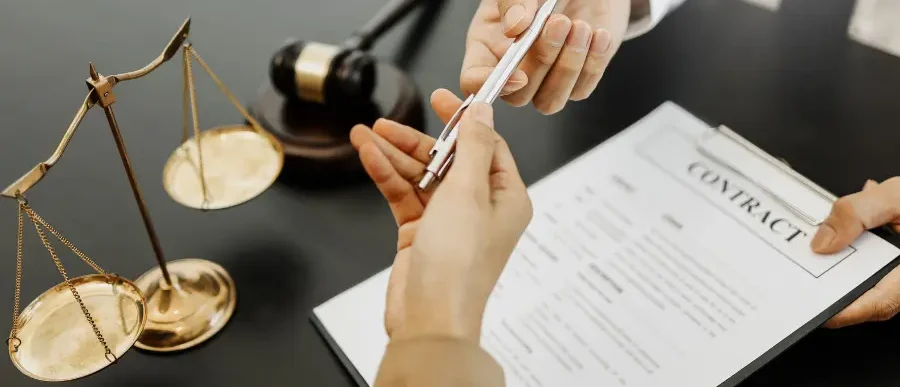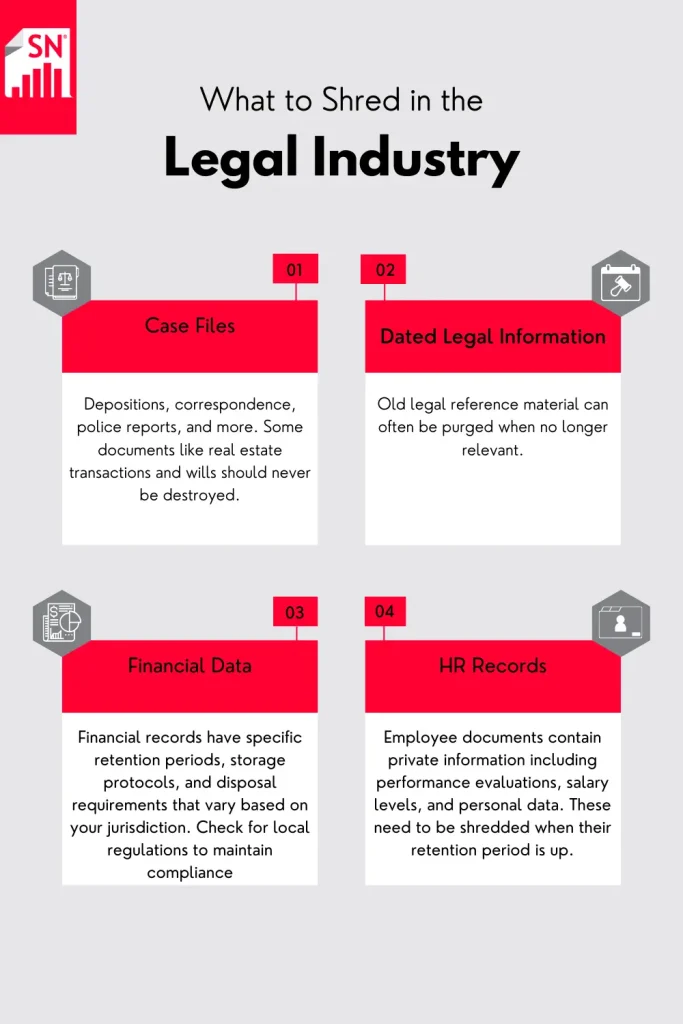
Client confidentiality is essential to the practice of law. Firms have a legal obligation to protect their clients’ data. Legal records shredding protects confidentiality by properly destroying documents and other media to prevent leaks of information. Building a reputation of high security and client trust will help your firm grow and thrive.
Legal Regulations
Federal privacy law applies to law firms and other businesses. Though the US doesn’t have a comprehensive federal privacy degree, several laws focus on specific types of data privacy. Any organization that collects, processes, or stores data is responsible for staying compliant with these regulations.
Legal offices should be familiar with and up-to-date on the following regulations:
The Gramm-Leach-Bliley Act (GLBA)
GLBA applies to any organization handling financial information. Law firms are required to protect electronic and paper-based financial data with safeguards like firewalls, encryption, and secure record disposal.
The Fair and Accurate Credit Transaction Act (FACTA)
FACTA protects personal consumer data from being exposed or stolen. The FACTA Disposal Rule states that you must dispose of any records containing a consumer’s personally identifiable information (PII) in a way so you can’t reconstruct them. Professional shredding complies with FACTA requirements.
The Health Insurance Portability and Accountability Act (HIPAA)
HIPAA regulates protected health information (PHI). Law firms handling insurance or health-related cases must take the proper precautions to safeguard PHI. Firms must avoid prohibited uses and disclosure of health data and use approved disposal methods, including shredding.
State Laws
Some states have specific privacy and document destruction laws, like California’s Shredding Law. Law firms should be familiar with local regulations when applicable.
Other Information Security Laws
Other regulations that may apply to legal offices and law firms include the Sarbanes-Oxley Act, the US Patriot Act, Payment Card Industry (PCI) Security Standards, and the Identity Theft Penalty Enhancement Act.
What to Shred in the Legal Industry

Whether you store private data on paper or digitally, certain legalities cover their management and destruction. Different rules will apply to specific document types and jurisdictions. The challenge is keeping track of the appropriate regulations and retention periods for each kind of record. Comprehensive document management will help track your documents from creation to destruction.
Law firms should shred any documents containing PII after the necessary retention period. Here are some common documents the legal industry handles that require shredding:
- Case Files: Case files include a wide range of documents including depositions, correspondence, police reports, and more. If you think you will need these documents in the future, you should keep them. Some documents like wills and real estate transactions should never be destroyed. Files should be kept for at least seven years but may vary based on the client or specific laws.
- Dated Legal Information: Old legal reference material can often be purged when it is no longer relevant. Most of these materials are now available online, making it unnecessary to store the materials.
- Financial Data: Financial records have specific retention periods, storage protocols, and disposal requirements that vary based on your jurisdiction. Be sure to check into your local regulations to maintain compliance.
- HR Records: Many law firms have their own HR department that collects information on employees. Employment documents contain private information including performance evaluations, salary levels, and personal data. After the retention period, these documents will need to be shredded to protect employee PII.
Legal Shredding Best Practices
Highly confidential information requires secure shredding practices. Law firms should follow legal shredding best practices to ensure the safe and secure destruction of their records.

- Use a reputable, professional shredding service: Professional shredding services follow strict security protocols and employ highly trained technicians. Shredding in-house may save money, but could also result in accidental exposure of information based on a lack of training or attention from employees who specialize in other things.
- Use secure shredding techniques: Not all shredders provide high security. Strip-cut shredders cut documents into long thin strips that can be reconstructed given some effort. Cross-cut or micro-cut shredders offer higher security and very unlikely reconstruction.
- Enforce policies that protect privacy: Law firms should have policies in place that protect sensitive information. Enforcing “Shred All” and “Clean Desk” policies prevents any documents from falling through the cracks and unintentionally exposing information.
- Employee Training: Employees should know how to identify sensitive information and properly manage records. They should be trained on safe shredding methods to prevent data leaks.
- Maintain a record of destruction: Law firms should maintain a record of destruction for every document they shred. A certificate of destruction should include details including the date of destruction and destruction method used.
Types of Legal Record Shredding
Mobile Shredding
Mobile shredding offers the highest security shredding for legal records. This specialized service includes witnessed shredding at your location. One of our certified shredding professionals will pick up your documents and destroy them at your curb. You can watch the entire process for legal purposes and peace of mind.
Offsite Shredding
Offsite shredding is completed in a secure, monitored shredding facility. It includes pick-up and safe transportation for your documents, as well as thorough destruction in industrial-strength shredders.
Scheduled Services
You can schedule Mobile and offsite shredding at regular intervals to meet your needs. Scheduled services maintain consistent compliance and assured privacy protection.
The Benefits of Shredding
Shredding not only protects privacy but can save money for your firm. Storage costs continue to rise, making every inch valuable real estate. Shredding safely disposes of documents you no longer need, making room for new files or other, more profitable activities.
Professional shredding is also convenient. A certified shredding company will provide locking shred bins to collect your documents, pick them up, and securely destroy all of your information. The process is quick, reliable, and so easy.
Find Legal Records Shredding Services Near You
Shred Nations provides trusted legal records shredding for law firms nationwide. Our services meet or exceed legal privacy requirements to protect you and your clients. Give us a call at (800) 747-3365 or fill out the form to connect with shredding providers near you. We are happy to answer all of your questions and find the best services to fit your needs.









